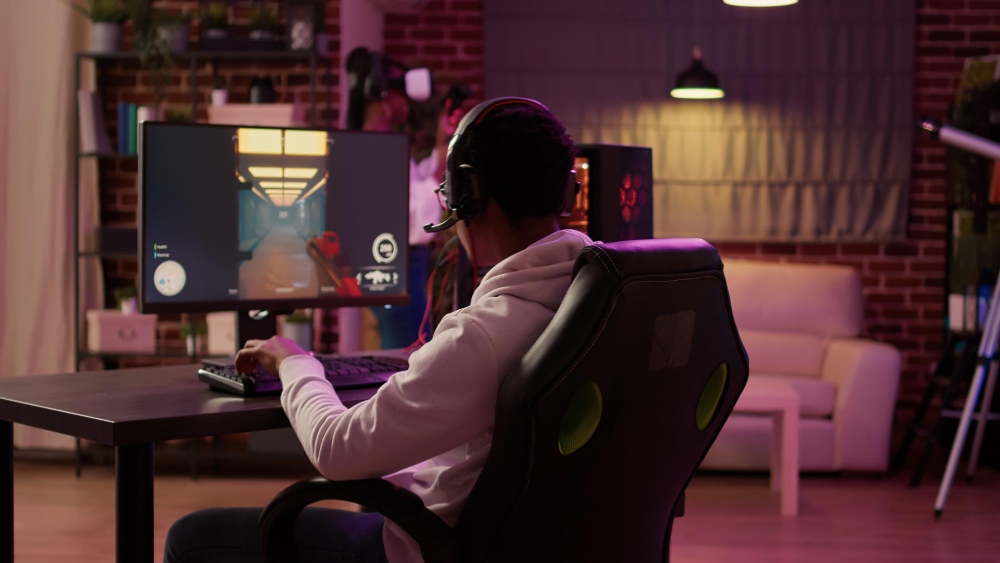Embarking on a journey into video game design opens doors to a vibrant and competitive field, offering various thrilling career options. The avenues to becoming a video game designer are diverse, each demanding a specific blend of education and experience. Delving into the intricacies of a video game designer’s role, understanding the career path, and average salary expectations, and honing the requisite skills are pivotal in determining if this is the perfect career for you. This guide will walk you through the unique process of becoming a video game designer in a conversational style, unravelling the essence of this dynamic profession.
How to Become a Video Game Designer: A Six-Step Adventure
1. Earn a High School Diploma
Embark on your journey by earning a high school diploma. Classes in graphic design and coding provide a solid foundation. Research job requirements and aim for a high GPA to stand out as a competitive candidate.
2. Pursue Additional Education
Post high school, dive into additional education to bolster your candidacy for coveted positions. Options span from formal university degrees to informal learning through online tutorials. Consider pursuing a bachelor’s degree in animation, computer science, game art, or graphic design. Engage in relevant coursework, secure internships, and explore various facets of video game design to pinpoint your specialization.
- Earning a Master’s Degree: While less common, some opt for a master’s program to elevate their prospects, especially when targeting top-tier companies. Focus on computer science and design, with some companies valuing a master’s degree as a substitute for experience.
- Attending Boot Camps: Intensive boot camps provide quick programming and design fundamentals immersion. Choose a program aligned with your game design interests, from mobile to console. Use this opportunity to develop practical skills and build a portfolio.
- Educational Independence: Leverage online resources for self-guided education, allowing flexibility. Although a slower path, it benefits career switchers or those working full-time jobs, ensuring alignment with industry trends.
3. Gain Experience
In the competitive field of video game design, experience is key. Seek jobs as a junior designer or explore roles like graphic designer or animator. Volunteer opportunities and personal game projects showcase your passion and skills.
4. Build a Resume or Portfolio
Forge a compelling narrative with a well-crafted resume and a captivating portfolio. Showcase:
- Your experience and projects
- Games designed, platforms used, and coding languages employed
- Proficiency in design programs and programming languages
- Soft skills like teamwork and communication
Your portfolio, featuring game screenshots, gameplay videos, and a demo reel, represents your unique design attributes.
5. Learn New Skills
Staying relevant in this evolving industry demands constant learning. Identify and enhance your skills, considering your strengths and weaknesses. Stay abreast of trends, coding languages, and methodologies through industry news, networking, and hands-on game exploration.
6. Stay Involved
Join video game and design associations to network with professionals. Attend conferences, workshops, and panels to delve into various design and development aspects. Certifications offered by associations can validate your expertise.
What Does a Video Game Designer Do?
Delve into the responsibilities of a video game designer, from developing visual content to collaborating with a team for successful game creation. Explore different types of video games a designer can create.
Average Salary for a Video Game Designer
Salaries for video game designers vary based on experience and location. According to Indeed Salaries, the average is $16.68 per hour. Notably, successful game studios often reward development teams with bonuses for their contributions to hit games.
Important Skills for a Video Game Designer
As a video game designer, honing a diverse skill set is imperative. Acquire and refine skills such as artistic vision, collaboration, communication, creativity, flexibility, innovation, mathematical aptitude, organizational prowess, problem-solving acumen, programming proficiency, software mastery, storytelling finesse, teamwork, and technical expertise.
Conclusion
Becoming a video game designer is a dynamic journey filled with learning, creativity, and innovation. By following these steps and honing essential skills, you can unlock doors to a rewarding career in the ever-expanding world of video games.
Frequently Asked Questions
Can I become a video game designer without a bachelor’s degree?
Absolutely. While a degree is beneficial, gaining experience through internships, personal projects, and continuous learning can also lead to a successful career.
What types of games can a video game designer create?
Video game designers can create various games, including console, mobile, computer, and massively multiplayer online games (MMOs).
Is a master’s degree necessary for a video game design career?
While not mandatory, some professionals opt for a master’s degree for specific roles with top-performing companies.
How can I stay updated on industry trends as a video game designer?
Stay informed by reading industry news and blogs, networking with professionals, attending conferences, and playing games to analyze what works and what can be improved.
What soft skills are crucial for video game designers?
Effective communication, teamwork, organization, time management, and adaptability are essential soft skills for video game designers.
